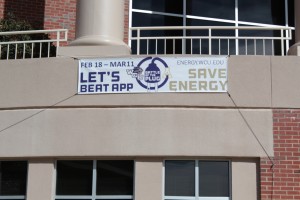The second annual Battle of the Plug kicks off this week, encouraging students to conserve energy.
Backed by the Student Government Association and the Resident Student Association, various events throughout campus will be held from Feb. 18 to March 11.
While the competition is to see whether Appalachian State University or Western Carolina University can reduce the most energy, residence halls will also compete against one another.
Last year WCU beat ASU in the first Battle of the Plug by reducing energy by 7.5% in three weeks.
The competition is a part of the Campus Conservation Nationals, the largest national competition to reduce water and electricity consumption in universities. Schools can compete against their own residence halls, rival schools or even against their region. This year community colleges are also allowed to participate.
Energy manager Lauren Bishop mentioned the idea of a conservation competition to ASU three years ago but was unable to pull the event together. Other schools in the UNC system have participated in the competition.
Every Monday, Wednesday and Friday energy meters from the residence halls will be checked to give students an idea of where they stand in the competition. The levels will be updated using a building dashboard.
Last year Reynolds Hall won the campus-wide competition and as a result were given refillable water bottle stations. This year’s prize is still being decided.
Students will be able to participate through building-wide programs as announced. Free tee shirts will be distributed at events and at basketball games.
Though students do not directly pay utility bills, a fee for utilities is included into the cost of residence halls. According to Bishop, the campus university bill for 2012 was approximately $4 million, equaling out to be around $1.34 per square foot.
Students can also help reduce their energy usage by:
- Turning off lights when not in use.
- Turning the water off when brushing their teeth.
- Taking quicker showers.
The building dashboard also offers ways for students to help conserve energy.
“I think it’s [the competition] made a big impact,” said Bishop.




